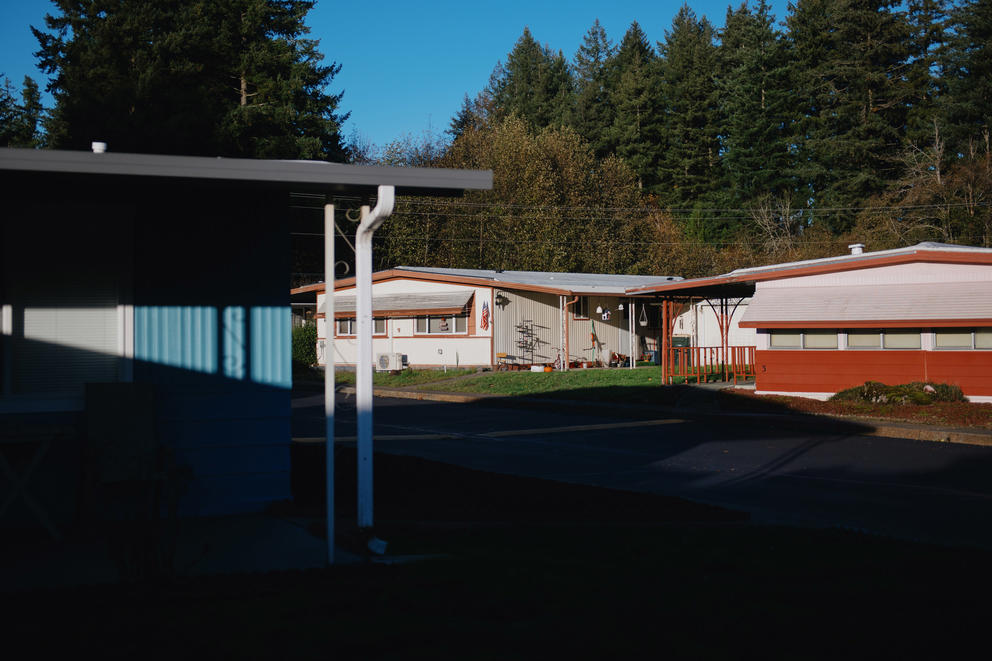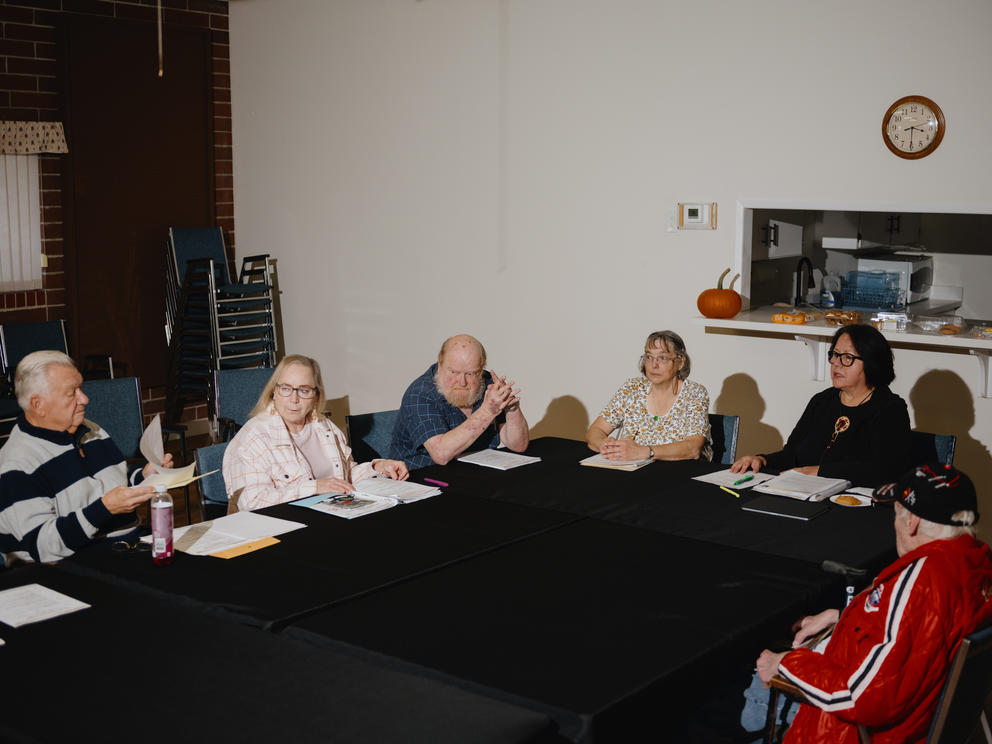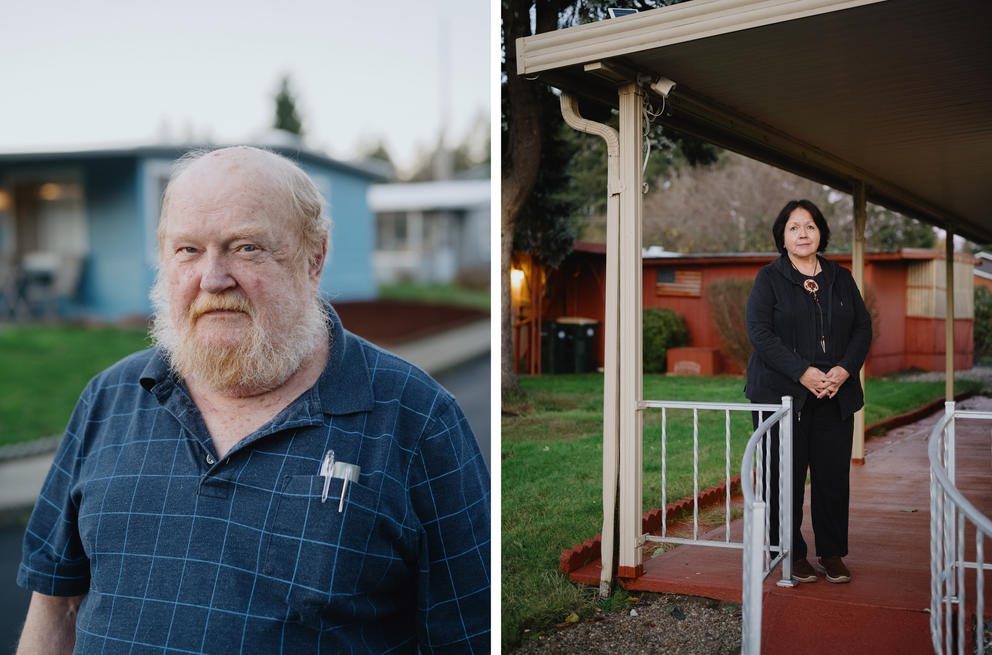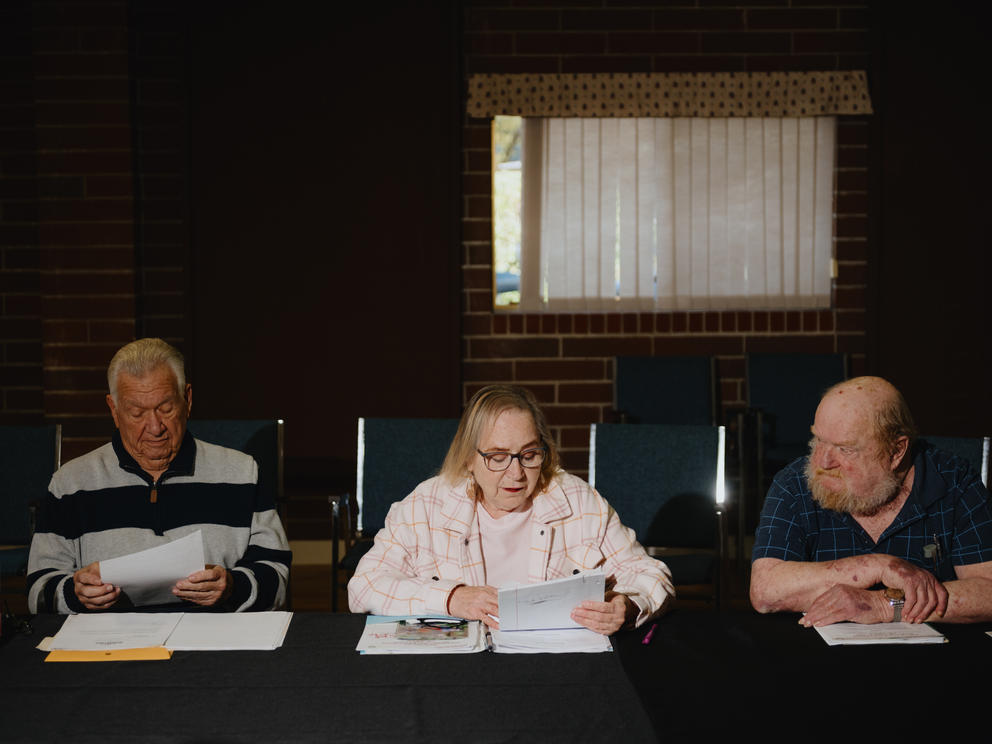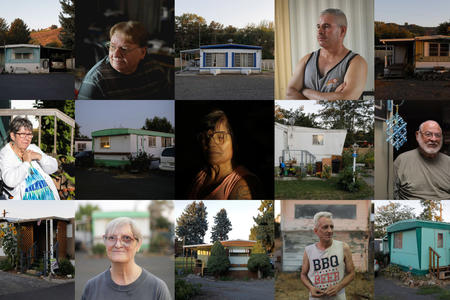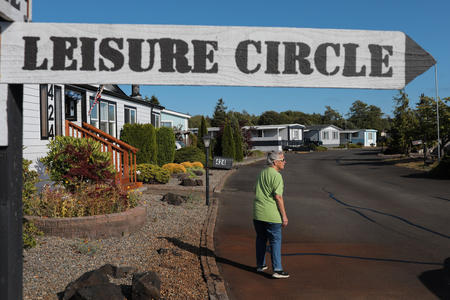Lucas and her partner in organizing, Mary Huntting, pushed together banquet tables and arranged chairs as the remaining members of the group trickled in. Eventually, everyone found a seat with Lucas and Huntting at the helm, eager to brief their colleagues on their latest organizing efforts.
“OK, so let's go ahead,” Lucas began. “This is our legislative team meeting.”
At 70, Lucas is channeling decades of political experience into saving the community she’s called home for 27 years. She’s scheduling strategy meetings, drafting letters and connecting with public officials. She admits it’s “become more than a full-time job.”
In June 2022, a national management company acquired their 65-lot community and announced monthly rental increases of 18% – about $100 a month, according to tenants. New renters face a 57% increase over previous rates. The company also introduced undefined “escalator costs” and allegedly limited access to communal spaces.
The unexpected cost hikes at Western Plaza mirror significant increases at other regional mobile home communities, alarming tenants on fixed incomes and sparking a collective urgency to organize whatever opposition they can rally. As park rents have risen, a growing number of residents have mobilized tenant associations to galvanize support and share resources.
“It feels to me like society is just kicking Grandma to the curb,” Lucas said. “That’s how it feels – kicking Grandma out on the street. And I think that we’ve reached the point now where all of these elders are threatened with homelessness. This is elder abuse, and we as a society need to address it as we need to make some changes.”
Left: Ken Clark, a resident and organizer at the Western Plaza senior living and mobile home community. Right: Kyle Taylor Lucas, a nearly 30-year resident at the Western Plaza Senior Mobile Home Park, has been instrumental in organizing tenants to fight back against their new landlord, Legacy Communities LLC, and the upping of rent at unsustainable rates. (Grant Hindsley for Crosscut)
Troubles after Legacy acquisition
Lucas, who is of the Tulalip Tribes and Cooks Ferry and Lytton Bands of the Nlaka’pamux Nation, has spent decades in tribal government affairs. She has had a voice in both local and federal politics, telling Crosscut she had spent “a lot of time in D.C. working on just the plethora of issues affecting Indian peoples in Indian Country,” including housing access. She also previously served on the Tumwater City Council, and currently serves as founder and chair of Urban Indians Northwest.
“Mary and I hear all of these stories from our individual tenants – and I will tell you that Mary and I have been brought to tears by these stories,” she said. “They’re just so harrowing. I had two elder women, in their 70s and late 80s, come to my door in tears telling me that ‘Kyle, I’m afraid I fear that I’m going to become homeless.’”
Legacy Communities LLC, a Florida-based management company with residential properties in at least 19 states, purchased Western Plaza last year following recent handoffs among local landlords. Thurston County Assessor’s Office records show Legacy Communities paid $9 million for the park — more than double the amount it was priced at in 2008.
Lucas and other tenants said they did not receive any notice of the sale, instead finding a letter posted in the mailroom after the change in ownership. State lawmakers have since enacted a new law requiring that tenants receive advance notice of any potential mobile home park sales.
“I never thought it would happen here – with the history,” said John Stockman, a resident of 10 years. “We’re talking 50-60 years of [local] ownership.”
As in other mobile home communities, Western Plaza tenants often own their manufactured houses while paying rent for the lot where they sit. What enticed many tenants, like Stockman, to the Tumwater park was its consistent affordability. With a record of monthly rent increases averaging just $10 to $15 a year, Western Plaza had presented itself as a forever home.
Those rates have jumped significantly under Legacy’s ownership. A rental history in one lease shows monthly rent hovering around $580 until 2022. Then it jumped to $670 a month. Legacy listed the current market rate for a new tenant at $950 a month. One member of the tenants’ group, Aliene Olsen, said come next February she will have to start paying close to $800 a month, about 80% of the monthly income she receives on Social Security.
Tenants told Crosscut that Legacy had also imposed fees that had not existed before, such as utilities, property tax charges and what the company calls “escalator costs” – potential unnamed costs that “may be increased on a pro-rata business.”
In a statement provided to Crosscut, Legacy’s chief operations officer Andrew Fells wrote that the company had already invested $250,000 in repairs and upgrades since acquiring Western Plaza, and pledged an additional $125,000 in the coming year.
“Legacy works diligently to mitigate costs to keep rent increases reasonable and to keep residents in our communities,” Fells wrote. “Unfortunately, as with most industries, economic conditions have changed drastically. … We try to lessen the impact of these increased costs on our existing residents as best as possible, even offering payment assistance programs.”
Lucas told Crosscut that many of the community’s residents live with disabilities – which only intensifies her worry over how and where tenants will go if Legacy prices them out.
Stockman has lived his entire life with ankylosing spondylitis, a condition that causes inflammation in the joints and ligaments of the spine. He told Crosscut he lives a “a very, very painful existence,” and just trying to receive help for that alone has proven to be especially difficult.
“I can’t travel all over the place to, you know, do things and see various physicians. So that’s another thing that kind of impacts my income,” he said. “I’m not an anxious person, but this whole rent thing – it’s really kind of – it’s really messing with me.”
As tenants grapple with the newly announced rental rates, they increasingly have turned to Lucas and Huntting for help. In late 2022, the pair started coordinating what would become Resident Action at Western Plaza Senior Mobile Home Park.
Organizing efforts take off
Under Lucas’ lead, Resident Action has started documenting complaints and gathering support at both the local and state level. The group has held regular strategy sessions and invited local officials to visit their community. They have filed complaints with the state attorney general’s office. In November 2022, 48 out of 66 of the park’s tenants signed onto a letter to Legacy regarding the rent increases.
Despite follow-up efforts, tenants said they received no response. In a February 2023 letter, tenants told Legacy they could no longer easily access their clubhouse for recreational club meetings – hindering Western Plaza’s “sense of community” and taking away their ability to enjoy one of the park’s most basic amenities.
“We want to reiterate the fear induced by your unprecedented high rent increases on our vulnerable seniors as well as on new residents,” the letter stated. “We are largely lower and fixed income elders who bought our homes as affordable. Please do not raise our rents by more than the usual $15 per month as has been typical for decades. People are fearing homelessness.”
Anne Sadler, a longtime mobile home owner in Mount Vernon and now the current president of the Washington Association of Manufactured Homeowners, said the reason there has been an uptick in organizing is simple – more and more mobile home communities are being hit with steep rent increases as both investment and management companies seek new ways to churn out a profit, which comes at the expense of “the most vulnerable people.”
“You can’t legislate morality,” she said.
Sadler anticipates this trend will only grow as she has been inundated with requests from tenants for support with budding homeowners’ associations. Following some early victories, she also believes tenants have a fighting chance in the upcoming legislative session when AMHO plans to advocate on behalf of bills that would impose rent caps and other regulations.
Resident Action also pursued mediation with Legacy through Thurston County’s local Dispute Resolution Center. Western Plaza served as a pilot case for the new program, with Lucas and Huntting dedicating five months to working with the city on the process until Legacy’s vice presidents allegedly bowed out late in the process.
“It was crushing,” Lucas recalled.
Huntting said Legacy had instead planned for Resident Action to meet with a regional manager, but “that was not good enough for us because that was not the agreement.”
Fells at Legacy Communities contended that the company had “provided all requested information to the arbitrators to facilitate the conversation. Upon review of that information it was determined that mediation was not warranted, by the arbitrators.”
Tumwater City Councilmember Leatta Dahlhoff, hailed by Western Plaza’s tenants as an ally to their organizing efforts, attended Resident Action’s November meeting. Dahlhoff told Crosscut that if the Dispute Resolution Center fails, she’s looking to request a new line item in Tumwater’s budget amendment that would pull $50,000 from the Resolution Center into a new senior protections category, which would include senior repairs and a pilot rental-assistance program.
Dahlhoff said she has managed to garner votes from her fellow council members on the budget amendment, and that there “will be a further discussion in January regarding the pilot project with dispute resolution, what that looks like and what they’ve been able to accomplish and reassessing that pilot.”
Getting political
Turnout at meetings was initially high, organizers said, but has started to dwindle as more and more seniors fear potential retaliation from their new landlord. Lucas and Huntting say they will take their battle to the State Capitol in nearby Olympia once the 2024 legislative session commences in January.
Resident Action has already been in contact with legislators who have promised to reintroduce bills from the previous session that would set rent caps on manufactured housing.
Two bills they plan on lobbying for if reintroduced are HB 1389 and HB 1388, sponsored by Alex Ramel, D-Bellingham, and Nicole Macri, D-Seattle. The former would tie rental rates to the rate of inflation or 3%, whichever is greater, with a cap at 7%, while the latter would empower courts to impose civil penalties against landlords found to be charging excessive rent.
In an interview with Crosscut in October, Ramel said he “absolutely intends to continue advocating for this policy next year.”
In the meantime, Resident Action’s members have begun plotting their visit to the Capitol – finding a moment to collectively banter amid their unease. Lucas told the group her daughter can print them matching T-shirts.
“What are some of the slogans we came up with, folks?” she asked, spurring them to throw around their ideas.
“Stop elder rent bankruptcy,” one offered. “Elders targeted for dollars,” the next said. Lucas and Huntting acknowledged the phrases as each person chimed in. Another spoke up:
“Gouging elders must stop.”
Get the latest investigative news
A newsletter for resources, data and behind-the-scenes insight into investigative efforts.

